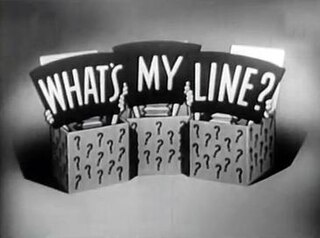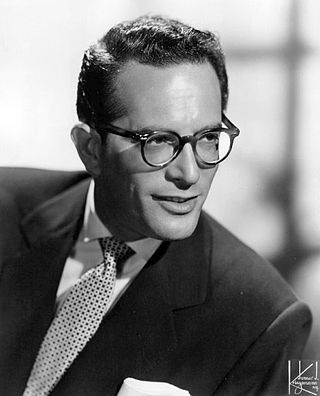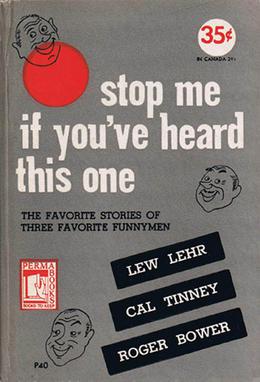Related Research Articles

Meet the Press is a weekly American television Sunday morning talk show broadcast on NBC. It is the longest-running program on American television, though its format has changed since the debut episode on November 6, 1947. Meet the Press specializes in interviews with leaders in Washington, D.C., across the country, and around the world on issues of politics, economics, foreign policy, and other public affairs, along with panel discussions that provide opinions and analysis. In January 2021, production moved to NBC's bureau on Capitol Hill in Washington, D.C.

John Florence Sullivan, known professionally as Fred Allen, was an American comedian. His absurdist topically-pointed radio program The Fred Allen Show (1932–1949) made him one of the most popular and forward-looking humorists in the Golden Age of American radio.

The $64,000 Question was an American game show broadcast in primetime on CBS-TV from 1955 to 1958, which became embroiled in the 1950s quiz show scandals. Contestants answered general knowledge questions, earning money which doubled as the questions became more difficult. The final question had a top prize of $64,000, hence the "$64,000 Question" in the show's title.

What's My Line? is a panel game show that originally ran in the United States, between 1950 and 1967, on CBS. The game show started in black and white and later in color, with subsequent U.S. revivals. The game uses celebrity panelists to question contestants in order to determine their occupation. The majority of the contestants were from the general public, but there was one weekly celebrity "mystery guest" for which the panelists were blindfolded. It is on the list of longest-running U.S. primetime network television game-shows. Originally moderated by John Charles Daly and most frequently with regular panelists Dorothy Kilgallen, Arlene Francis, and Bennett Cerf, What's My Line? won three Emmy Awards for "Best Quiz or Audience Participation Show" in 1952, 1953, and 1958 and the Golden Globe Awards for Best TV Show in 1962.
Twenty questions is a spoken parlor game which encourages deductive reasoning and creativity. It originated in the United States and was played widely in the 19th century. It escalated in popularity during the late 1940s, when it became the format for a successful weekly radio quiz program.

Robert Q. Lewis was an American radio and television entertainer, comedian, game show host and actor. Lewis added the middle initial "Q" to his name accidentally on the air in 1942. He responded to a reference to radio comedian F. Chase Taylor's character Colonel Lemuel Q. Stoopnagle by saying "and this is Robert Q. Lewis." He decided to retain the initial, telling interviewers it stood for "Quizzical."
Information Please is an American radio quiz show, created by Dan Golenpaul, which aired on NBC from May 17, 1938, to April 22, 1951. The title was the contemporary phrase used to request from telephone operators what was then called "information" and later called "directory assistance".

Quiz Kids is a radio and TV series originally broadcast in the 1940s and 1950s. Created by Chicago public relations and advertising man Louis G. Cowan, and originally sponsored by Alka-Seltzer, the series was first broadcast on NBC from Chicago, June 28, 1940, airing as a summer replacement show for Alec Templeton Time. It continued on radio for the next 13 years. On television, the show was seen on NBC and CBS from July 6, 1949, to July 5, 1953, with Joe Kelly as quizmaster, and again from January 12 to September 27, 1956, with Clifton Fadiman as host.

Stop Me If You've Heard This One was a comedy radio series, created by the actor-humorist Cal Tinney and sponsored by Quaker Oats. Hosted by Milton Berle, it aired Saturday evenings at 8:30pm on NBC beginning October 7, 1939.
The following is the 1950–51 network television schedule for the four major English language commercial broadcast networks in the United States. The schedule covers primetime hours from September 1950 through March 1951. The schedule is followed by a list per network of returning series, new series, and series cancelled after the 1949–50 season. This season became the first in which primetime was entirely covered by the networks. It was also the inaugural season of the Nielsen rating system. Late in the season, the coast-to-coast link was in service.
Celebrity Time was an American game and audience participation television series that was broadcast on ABC in 1949 - 1950 and on CBS in 1950 - 1952. The original host was Douglas Edwards.
Down You Go is an American television game show originally broadcast on the DuMont Television Network. The Emmy Award-nominated series ran from 1951 to 1956 as a prime time series primarily hosted by Dr. Bergen Evans. The program aired in eleven different timeslots during its five-year run.
Colgate Theatre is a 30-minute dramatic television anthology series telecast on NBC during 1949, returning during 1958, for a total of 50 episodes in two different formats.
Fishing and Hunting Club is a DuMont Television Network program that was aired on Fridays at 9 pm ET from September 30, 1949, to March 31, 1950. On January 20, 1950, the name of the show changed to Sports for All.
Fighting Words is a Canadian panel quiz television series which aired on CBC Television from 1952 to 1962. The series returned for short runs in 1970 and 1982.

Kay Kyser's Kollege of Musical Knowledge is an American old-time radio musical quiz program starring Kay Kyser. It was broadcast on Mutual, NBC, and ABC beginning on February 1, 1938, and ending on July 29, 1949.
This Is Show Business is an American variety television program that was broadcast first on CBS and later on NBC beginning July 15, 1949, and ending September 11, 1956. It was CBS-TV's first regular series broadcast live from coast to coast. It was originally titled This Is Broadway.

Twenty Questions, based on the guessing game Twenty questions, started as a radio quiz show in 1946. The television series ran on NBC in 1949, on ABC from 1950 to 1951 and on the DuMont Television Network from 1951 to 1954.
Answer Yes or No is an American television game show that was broadcast on NBC from April 30, 1950, until July 23, 1950.
Hit the Jackpot is an American radio quiz program that was broadcast on CBS from May 9, 1948, through December 27, 1949, and from May 28, 1950, through September 3, 1950. It was originally titled Try 'n' Stop Me and then called Catch Me If You Can before Hit the Jackpot took effect on June 13, 1948.
References
- 1 2 3 Brooks, Tim; Marsh, Earle (1999). The Complete Directory to Prime Time Network and Cable TV Shows 1946-Present (7th ed.). New York: The Ballentine Publishing Group. p. 1019. ISBN 0-345-42923-0.
- ↑ Crosby, John (November 13, 1949). "Quizmaster Cantor Carries On and On". Pittsburgh Post-Gazette. p. 22. Retrieved January 30, 2021– via Newspapers.com.
- 1 2 "Sunday, September 3". Ross Reports on Television including The Television Index. September 3, 1950. p. 4. Retrieved September 19, 2022.
- ↑ McNeil, Alex (1996). Total Television (4th ed.). New York, New York: Penguin Books USA, Inc. p. 830. ISBN 0-14-02-4916-8.